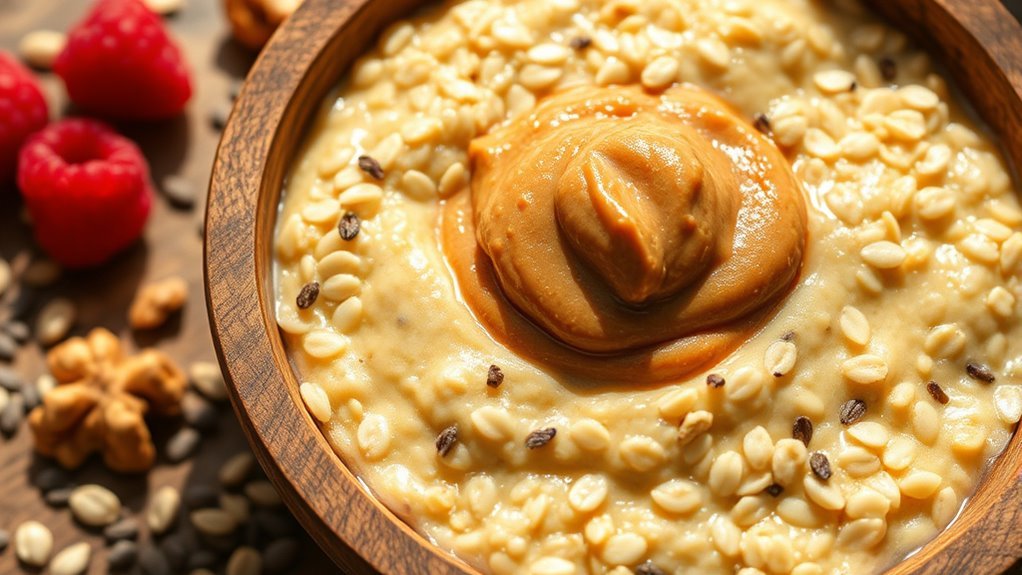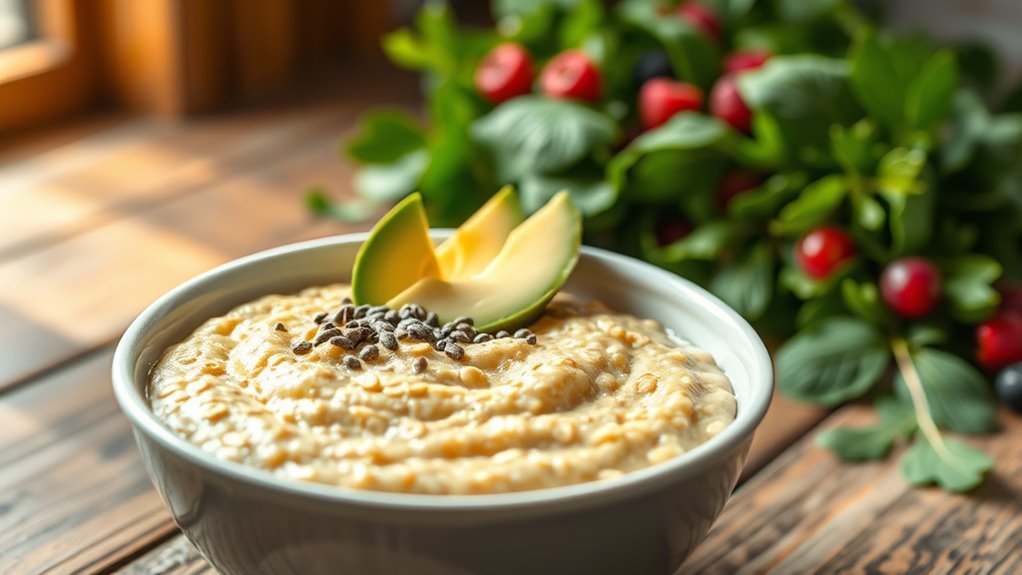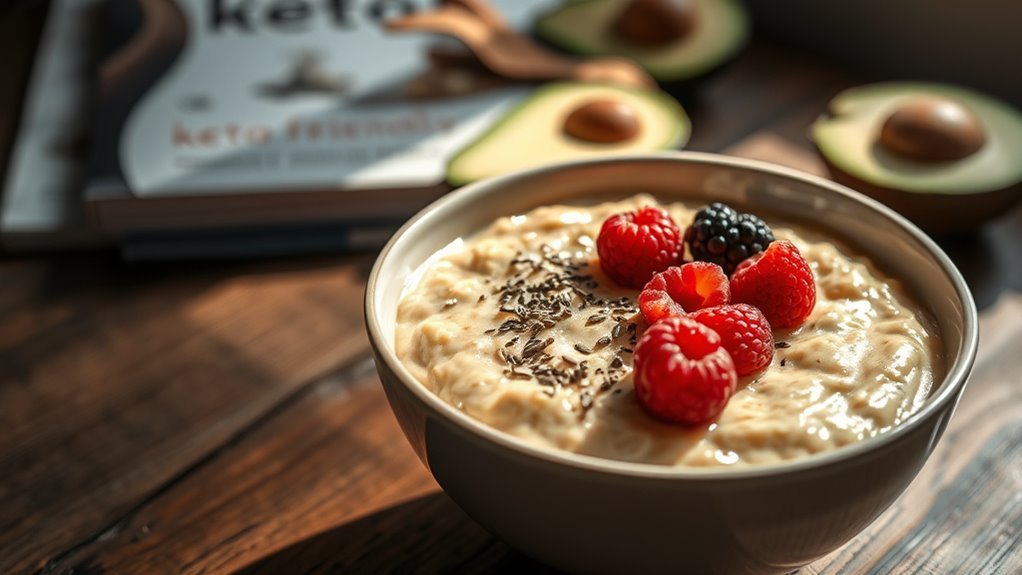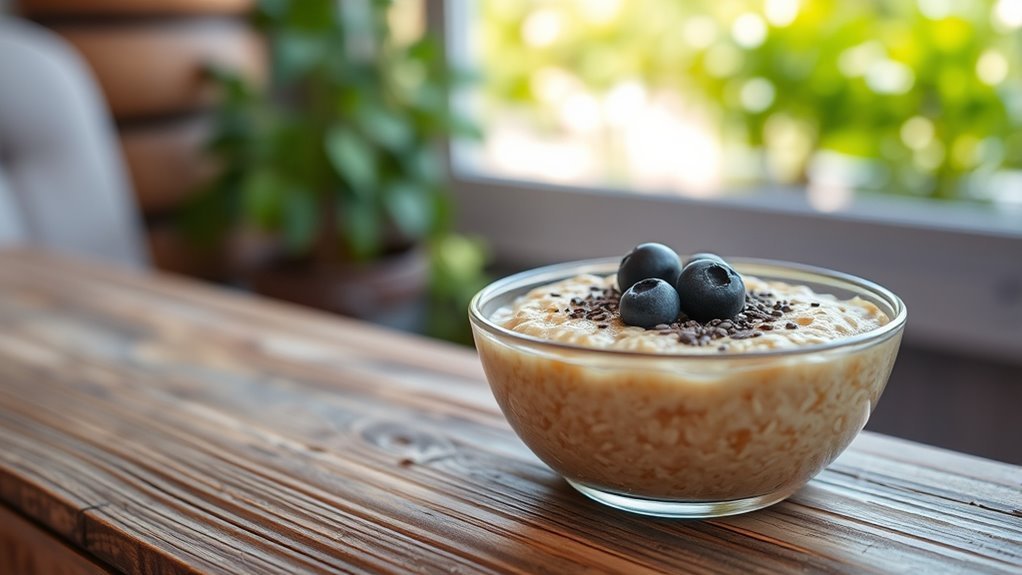Oats are generally high in carbohydrates, which can make it tough to include them on a strict keto diet. With around 27-30 grams of carbs per cup, even a small serving can push you over your daily carb limit, disrupting ketosis. While oats have benefits like fiber and nutrients, their carb content can hinder your goals. However, there are ways to incorporate oats in moderation or find suitable alternatives. You’ll discover more about balancing oats and keto-friendly options ahead.
Understanding the Keto Diet

When you plunge into the keto diet, you’ll find it fundamentally shifts your body’s metabolism by drastically reducing carbohydrate intake and increasing fat consumption. This change aligns with the keto principles, which emphasize a high-fat, moderate-protein, and low-carb approach. By adhering to these dietary restrictions, your body enters a state called ketosis, where it burns fat for fuel instead of carbohydrates. This metabolic shift can lead to weight loss and increased energy levels, offering a sense of freedom from traditional dieting constraints. However, it’s essential to understand that the keto diet isn’t one-size-fits-all; individual responses can vary. Consequently, it’s vital to monitor your body’s reactions and adjust accordingly for a sustainable and satisfying experience. Additionally, incorporating healthy fats into your meals can enhance your overall success on the keto diet.
Nutritional Profile of Oats

When contemplating the nutritional profile of oats, you’ll find that they offer a unique macronutrient breakdown, primarily consisting of carbohydrates, protein, and fats. Additionally, their high fiber content can be beneficial for digestive health, while their glycemic index is an important factor to contemplate if you’re following a keto diet. Understanding these aspects can help you make informed choices about incorporating oats into your meal plan.
Macronutrient Breakdown
Oats are a popular staple in many diets, but if you’re considering them on a keto plan, it’s essential to understand their macronutrient profile. Different oat varieties have varying nutritional values, and cooking methods can also influence their carb content. Here’s a breakdown to help you decide:
| Oat Variety | Carbs (g) | Protein (g) |
|---|---|---|
| Rolled Oats | 27 | 6 |
| Steel-Cut Oats | 29 | 6 |
| Instant Oats | 30 | 5 |
| Oat Flour | 75 | 12 |
As you explore these options, keep in mind that even the lower-carb varieties may still exceed your daily carb limits on keto. Make informed choices!
Fiber Content Insights
While you might be drawn to oats for their health benefits, understanding their fiber content is essential, especially on a keto diet. Oats are a notable source of dietary fiber, offering various digestion benefits that can help you feel fuller longer. However, if you’re focusing on maintaining ketosis, here are some key insights about oats as fiber sources:
- Soluble Fiber: Aids in managing cholesterol levels.
- Insoluble Fiber: Supports regular bowel movements.
- Beta-Glucan: Reduces inflammation and promotes gut health.
- Fiber Content: High in carbs, which may disrupt ketosis.
Incorporating oats wisely can offer these benefits, but moderation is key to staying within your keto goals. Additionally, understanding the role of carbohydrates in a ketogenic diet can help you make informed decisions about including oats in your meals. Knowledge empowers your choices, giving you the freedom to enjoy your diet.
Glycemic Index Considerations
Understanding the glycemic index (GI) of oats is fundamental for anyone on a keto diet, as it can greatly impact blood sugar levels. Oats typically have a moderate GI, which means they can provoke a notable glycemic response. This may not align with the low-carb principles of keto, where maintaining stable blood sugar is essential for ideal insulin sensitivity. If you’re considering incorporating oats into your diet, it’s important to be mindful of portion sizes and opt for steel-cut or whole oats, as they generally cause less of a spike in blood sugar compared to instant varieties. Additionally, high carbohydrate content can hinder ketosis, making it essential to understand how oats fit into your macronutrient goals. Ultimately, knowing how oats fit into your macronutrient goals will help you maintain the freedom and balance you seek in your keto lifestyle.
Carb Content in Oats

When considering a ketogenic diet, it’s vital to be aware of the carb content in various foods, including oats. Different oat varieties can greatly impact your carb intake, which is important for maintaining ketosis. Here’s a breakdown:
- Rolled oats: About 27 grams of carbs per cup.
- Steel-cut oats: Approximately 28 grams of carbs per cup.
- Instant oats: Roughly 30 grams of carbs per cup.
- Oat bran: Around 14 grams of carbs per cup.
These numbers show that oats can quickly pile on the carbs. If you’re looking for carb alternatives, consider options like chia seeds, flaxseeds, or almond flour, which can keep your meal plan aligned with keto principles while still providing the freedom to enjoy tasty foods. Additionally, understanding the carbohydrate limits necessary for maintaining ketosis is essential for successful adherence to the ketogenic diet.
Impact of Oats on Ketosis
Although oats are often praised for their nutritional benefits, their impact on ketosis can be significant due to their high carbohydrate content. If you’re aiming for ketosis, oats consumption can hinder your progress, as their carbs may exceed your daily limit. This can lead to ketosis effects that prevent your body from efficiently burning fat for fuel. While some individuals may experiment with small amounts of oats and still maintain ketosis, it’s essential to monitor your body’s response closely. If you choose to include oats, consider portion control and balance them with lower-carb foods. Ultimately, staying informed about how your body reacts to oats can empower you to make choices aligned with your keto goals.
Potential Benefits of Oats
While oats may not be the best choice for a strict ketogenic diet, they do offer several potential benefits that can be appealing in other dietary contexts. Here are some nutritional benefits to evaluate:
- Heart Health: Oats are rich in beta-glucan, a soluble fiber known to lower cholesterol levels and improve heart health.
- Sustained Energy: The complex carbohydrates in oats can provide long-lasting energy, keeping you fueled throughout the day.
- Digestive Wellness: Their high fiber content promotes healthy digestion and can help prevent constipation.
- Nutrient Dense: Oats are packed with essential vitamins and minerals, including iron, magnesium, and B vitamins, supporting overall health.
These benefits make oats a worthwhile evaluation in a balanced diet, offering freedom in your food choices.
Drawbacks of Including Oats in a Keto Diet
Including oats in a keto diet can pose challenges, especially due to their carbohydrate content. While oats provide fiber and nutrients, their high carb levels can hinder your progress on a keto plan. If you’re serious about your carb restrictions, it’s essential to evaluate how oats fit into your daily intake. Furthermore, excessive carb intake from higher-carb foods can push you out of ketosis.
| Drawback | Impact on Keto | Oat Alternatives |
|---|---|---|
| High in Carbs | Slows ketosis | Chia seeds |
| Blood Sugar Spike | Increases cravings | Almond flour |
| Nutrient Density | Less overall benefit | Flaxseeds |
Instead of oats, exploring oat alternatives can help you maintain ketosis while enjoying satisfying meals. Remember, choosing the right foods empowers your journey toward freedom on a keto diet.
Alternatives to Oats for a Keto-Friendly Breakfast
When you’re on a keto diet, finding satisfying breakfast options that keep you within your carb limits can be challenging. Luckily, there are great alternatives to oats that can kickstart your day without derailing your progress. Here are four delicious options:
- Chia Pudding: Mix chia seeds with unsweetened almond milk for a creamy, satisfying breakfast rich in fiber and healthy fats.
- Almond Flour Pancakes: Whip up pancakes using almond flour for a low-carb twist on a classic favorite.
- Egg Muffins: Bake eggs with veggies and cheese in muffin tins for a portable breakfast.
- Greek Yogurt: Choose full-fat, plain Greek yogurt topped with nuts for added crunch and protein.
Incorporating these alternatives allows you to enjoy nutrient-dense meals while keeping an eye on your carbohydrate content, helping you stay on track while enjoying your breakfast!
Tips for Incorporating Oats Into a Low-Carb Lifestyle
Although oats are higher in carbs compared to other breakfast options, you can still incorporate them into a low-carb lifestyle with some mindful adjustments. Start by choosing smaller portions, like a half serving, to minimize carb intake. Consider mixing oats with low-carb oatmeal substitutes, such as chia seeds or flaxseeds, which can help you achieve a similar texture while keeping the carbs down. You can also blend oats into smoothies for a nutrient boost without overdoing it. For snacks, try making keto-friendly energy balls using oats combined with nuts and nut butter. This way, you can enjoy oats in moderation, balancing your cravings with your low-carb goals.
Making Informed Choices for Your Keto Journey
As you begin your keto journey, making informed choices is essential for achieving your health goals. Embracing a low-carb lifestyle can be liberating, but it requires thoughtful meal planning and portion control. Here are four key considerations to guide you:
Starting your keto journey requires informed choices and careful planning for lasting health benefits.
- Understand macronutrients: Know your daily carb, protein, and fat targets to stay in ketosis.
- Prioritize whole foods: Focus on nutrient-dense options like leafy greens, avocados, and quality proteins.
- Track your meals: Use apps to monitor what you eat and guarantee you’re meeting your goals.
- Stay flexible: Remember, it’s okay to adjust your plan based on how your body responds.
With these strategies, you can navigate your keto journey effectively and enjoy the freedom of better health.
Frequently Asked Questions
Can I Eat Oats Every Day on Keto?
You can’t eat oats every day on keto if you want to stay in ketosis. Think of oats as a tempting siren song, luring you with their benefits like fiber and nutrients. However, their high carb content means they can sink your keto ship. Instead, look for keto alternatives like chia seeds or flaxseeds that offer similar benefits without the carb overload. Embrace these options for a balanced approach while enjoying your dietary freedom.
Are Overnight Oats Keto-Friendly?
Overnight oats aren’t typically keto-friendly due to their high carb content. If you’re looking for keto alternatives, consider using chia seeds, flaxseeds, or almond flour to create a similar texture without the carbs. You can mix these with low-carb milk, like almond or coconut milk, and add some berries or nuts for flavor. This way, you can enjoy a satisfying breakfast while staying within your carb limits.
What Types of Oats Are Best for Keto?
When you’re exploring the keto landscape, think of it like choosing a paint palette; the right colors can create a masterpiece. For low-carb oats, consider alternatives like chia seeds or flaxseeds, which mimic the texture while keeping carbs in check. If you’re craving a warm bowl, look for brands offering “keto-friendly” oatmeal, often made from almond or coconut flour. These options let you enjoy the comfort of oats without straying from your goals.
Can I Use Oat Flour in Keto Recipes?
You can use oat flour in keto recipes, but it’s important to be mindful of its carb content. Oat flour does offer benefits like added fiber and nutrients, which can enhance your keto baking. However, since it’s higher in carbs compared to typical keto-friendly flours, moderation is key. Consider mixing it with nut flours to balance the carb count while still enjoying the unique flavor and texture oat flour provides in your dishes.
How Do Oats Compare to Other Grains on Keto?
When comparing oats to other grains on keto, you’ll find that oats have a higher carbohydrate content. Oats’ nutritional profile shows they’re rich in fiber but also contain about 27 grams of carbs per 100 grams, which can hinder ketosis. In contrast, grains like quinoa or cauliflower rice offer lower carb options. If you’re watching your carb intake, consider these alternatives to maintain your freedom in choosing keto-friendly foods.
References
- https://www.healthline.com/nutrition/can-you-eat-oats-on-keto
- https://www.ncbi.nlm.nih.gov/pmc/articles/PMC5552830/
- https://www.medicalnewstoday.com/articles/324153
- https://www.dietdoctor.com/low-carb/keto/foods
- https://www.webmd.com/diet/obesity/what-is-the-keto-diet
- https://www.diabetes.org/nutrition/healthy-foods/what-to-eat-on-keto-diet
- https://www.mayoclinic.org/healthy-lifestyle/nutrition-and-healthy-eating/expert-answers/keto-diet/faq-20457912
- https://www.nutrition.gov/
- https://www.cdc.gov/healthyweight/healthy_eating/index.html


